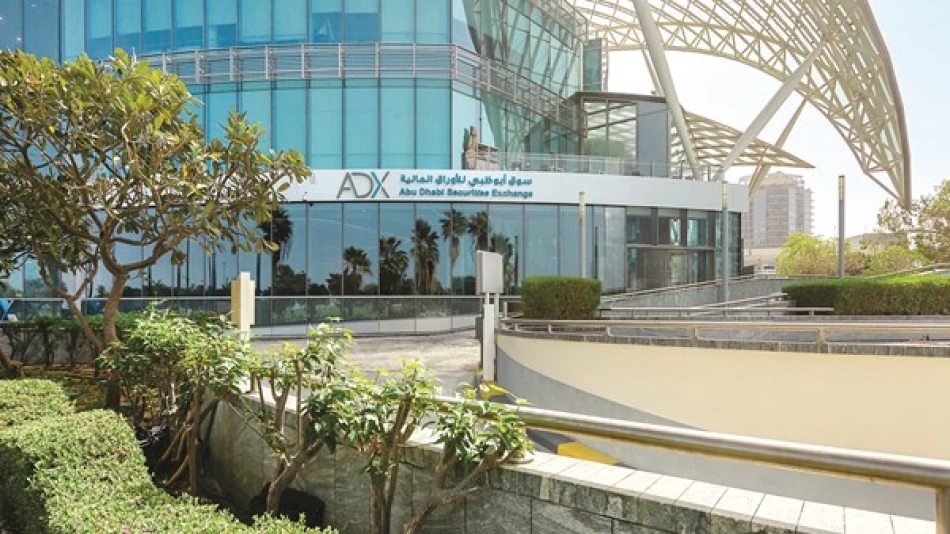
Local Stock Markets Soar to Staggering 32.66 Billion Dirhams in Gains
UAE Stock Markets Hit Historic Highs as Banking Sector Fuels Economic Confidence
The UAE's stock markets surged to multi-year highs yesterday, with Dubai's main index breaking above 6,100 points for the first time since January 2008, signaling renewed investor confidence in the Emirates' economic resilience and banking sector profitability. The rally added 32.66 billion dirhams to market capitalization as banking stocks led the charge across both Abu Dhabi and Dubai exchanges.
Abu Dhabi Securities Exchange Breaks 10,000 Barrier
The Abu Dhabi Securities Exchange (ADX) general index climbed 66.16 points, or 0.65%, to close at 10,242.49 points—a significant psychological milestone above the 10,000 mark. Trading volume reached 1.6 billion dirhams across 433 million shares through 37,057 transactions.
Banking stocks dominated the gains, with Commercial Bank International surging 10.11% to 1.1 dirhams and Bank of Sharjah jumping 8.1% to 1.2 dirhams. Even heavyweight First Abu Dhabi Bank contributed with a 3.49% rise to 17.76 dirhams, demonstrating broad-based strength across the sector.
The market's total capitalization expanded to 3.131 trillion dirhams, adding 12.68 billion dirhams in a single session—a clear indication of institutional and retail investor appetite for UAE equities.
Dubai Breaks 16-Year Ceiling
Dubai Financial Market delivered an even more dramatic performance, surging 128.66 points or 2.15% to close at 6,103 points. This milestone represents the highest level since the pre-financial crisis peak in January 2008, suggesting the emirate's economy has not only recovered but potentially exceeded its previous heights.
Emirates NBD, the region's largest banking group, led the charge with a 3.97% gain to 27.45 dirhams—marking a new all-time high. Commercial Bank of Dubai jumped 11% to 9.99 dirhams, while Mashreq Bank added 5.28% to reach 259 dirhams.
Dubai's market capitalization swelled by 19.97 billion dirhams to reach 1.057 trillion dirhams, reflecting the emirate's growing appeal as a financial hub.
Banking Sector: The Engine of Growth
The banking sector's stellar performance reflects several fundamental drivers. UAE banks have benefited from rising interest rates, which typically expand net interest margins and boost profitability. Additionally, the country's economic diversification efforts, robust real estate market, and position as a regional business hub have supported loan growth and reduced credit risk concerns.
This banking rally mirrors similar trends seen in other Gulf markets, where financial institutions have capitalized on higher oil revenues, increased government spending, and regional economic stability. However, the UAE's performance stands out due to its more diversified economy compared to purely oil-dependent neighbors.
Market Implications and Investor Perspective
The combined trading value of 2.56 billion dirhams across both exchanges, involving over 760 million shares, indicates robust liquidity and genuine investor interest rather than speculative trading. This volume suggests institutional participation, which typically provides more sustainable price support.
For international investors, these levels may signal an opportune entry point into a market that has demonstrated resilience through global economic uncertainties. The UAE's strategic location, business-friendly policies, and ongoing economic reforms continue to attract foreign capital.
Historical Context and Future Outlook
Dubai's breach of the 6,100-point level carries particular significance, as it represents a full recovery from the 2008 financial crisis that severely impacted regional markets. The 16-year journey back to these heights reflects the UAE's successful economic transformation and diversification strategy.
The current rally appears supported by strong fundamentals rather than speculative fervor. UAE banks' consistent profitability growth, the country's expanding non-oil economy, and its role as a regional financial center provide a solid foundation for continued market strength.
With 38 companies advancing versus 37 declining on the Abu Dhabi exchange, and similar balanced participation in Dubai, the rally demonstrates broad-based investor confidence rather than narrow sectoral enthusiasm. This breadth suggests the current momentum may have staying power as the UAE economy continues its upward trajectory.
Most Viewed News

 Layla Al Mansoori
Layla Al Mansoori






